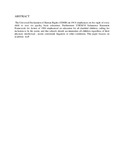Academic staff effectiveness in mainstreaming disability interventions for students with special needs in public Universities in Kenya : A cas e of the University of Nairobi

View/
Date
2015-07-23Author
Imonje, Rosemary
Nyagah, Grace
Language
enMetadata
Show full item recordAbstract
The
Universal Declaration of Human Rights (UDHR) in 194
8 emphasizes on th
e right of every
child to rece
ive quality basic education.
Furthermore UNESCO
Salamanca Statement
Framework for Action of 1994
emphasized on education for
all disabled children, calling for
inclusion to be the norm; and that schools should accommodate all
children regardless of their
physical, intellectual
, social, emotional, linguistic or other conditions.
This paper focuses on
academic staff
’s
(teaching staff)
effectiveness
in mainstreaming disability interventions for
students with special needs in publi
c universities in Kenya
; a case of the University of Nairobi.
University of Nairobi
, as other public universities, has
a disability mainstreaming policy, throug
h
which staff is being
t
rained on matters of disability
, in order to facilitate the needs of stu
dents
with special needs
;
as
reported in the Strategic Plan (2013
-
2018), whereby
,
90% of the teaching
staff
were
trained in pedagogical and andragogical skills.
The question is
,
how many of the 90%
trained teac
hing staff,
were trained in disability skills
, knowledge and attitudes
? How many of
those trained can effectively interact with students who have special needs in the teaching
-
learning process?
Hence, th
is
study
examined capacity building initiatives; type of
resources, content
and methodologies th
at the academic staff utilizes
when dealing with st
u
dents with
disability
.
A
case study design
was employed;
and
the study
targeted students with special needs, at
undergraduate level, dean of students, academic staff, chairpersons
of departments,
R
egistr
ar
s
(academic and
administration
),
dean of
schools
,
and
interpreters for the deaf
students
. D
ata
collection
instruments
included interview
schedules, observation schedules, questionnaires, and
document analysis.
The study found out that resources, faciliti
es and infrastructure; teaching and learning
methodologies, content preparation modes, lack of skills, attitudes knowledge in handling
students with disabilities not only influenced academic staff effectiveness in mainstreaming
disability interventions but
also influenced learning outcomes among students with special needs.
The study recommended a scheduled capacity building programme where academic
staff is
trained
and sensitized
on knowledge, skills and attitudes
on how to teach assess and manage
students
with disability.
Citation
Imonje, Rosemary and Nyagah, Grace (2015). Academic staff effectiveness in mainstreaming disability interventions for students with special needs in public Universities in Kenya : A cas e of the University of Nairobi. Abstracts of the 2nd AFRICE international conference held at Kenya science campus on 18-23rd July 2015Publisher
University of Nairobi
